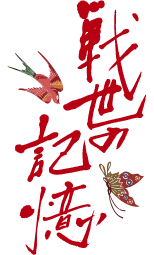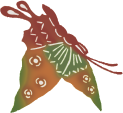
“Refuge in a natural cave in Itosu”
“Refuge in a natural cave in Itosu”
Tomi Nakandakari, 93 years old
(Place of birth: Itosu, Itoman City, Okinawa Prefecture)
Since we would have been attacked with naval guns if the lights at mealtime were spotted, we had supper outside on grain bags spread over the ground without light.
Although we heard that the US Armed Forces were coming from Yomitan, we saw nine American planes, three times in three-plane formation, over our house from Kyan Cape.
After the air raid started, we evacuated into a natural shelter (cave). It was the natural shelter called Unjar-gama behind our village that we evacuated into. We did not get out of the shelter during daytime as it was dangerous, but when night fell, we went back to our house to prepare our meals. As we had some food in the shelter as well, I went back to our house just to cook some rice. Then, I found our house completely burnt down and razed to the ground.
Then, my father came to the shelter in which we were hiding and said to my eldest brother and me, “The enemies are approaching Shuri. I buried some pottery and a tea pot containing some money in the pit I dug beside our house. Just dig them out and use the money for yourselves after the war. The enemies may have already reached Shuri. Do not go out of the shelter because it will be dangerous.” That was the last time we saw our father, and we never saw him again.
Not long after that, a strange family, a mother and her three children, came to the shelter saying, “Please help us.” We could not turn them away. There was a 15-year-old girl and a 9-year-old boy in the family. I started feeling sorry for them and thought they would be pleased if I go out and bring some sugar for them from the sugar-barrel in our horse barn. I got out of the shelter, headed for the horse barn and then I noticed that the family was coming after me. At that instant, a cannon shell fired from the warship exploded behind me. The mother was injured in the chest by a shell splinter and killed on the same day. The 15-year-old girl was killed as well. The 9 -year-old boy was blown away to the horse barn with his legs torn apart from his body. I saw his legs still moving and was so sad and felt sorry for him.
The 3-year-old child was left alone. The mother of the child told me before she died, “If I die, would you please take my children home? We are the Kawakami family from Shuri.” However, since the war was becoming only worse and fiercer, it was just not possible and the child just kept crying.
There were many evacuees in the horse barn and one old man told me that if the children had kept crying, we would have hit by a naval cannon fire. He also said, “We cannot keep the dead bodies here. They will start smelling soon and we will not be able to stay hidden here.” He carried the dead bodies to the nearby field and laid them there.
(After the war)
Even now, when I stay at my parent’s house, I cannot walk on the street at night. I saw many injured and dead people all over the place back then, including people disemboweled, a baby sucking the breast of its mother who was already dead and swollen dead bodies. This is the reason why I still cannot walk on the street at night.
(Under naval gunfire)
The houses back then were surrounded by stone walls and people climbed over the stone walls when escaping. There was a child who could not climb over the stone wall crying for help yelling, “Mother, help me!” but I could not help the child. Then while I was hiding in a long and narrow trench, a shell splinter flew over and fell right beside my leg. The shell splinter was still smoking. I thought that if the shell splinter had directly hit me, I would have been killed. I believe that my mother and father must have been watching over me from heaven and saved me.
(Looking back at the war)
When I talk about the war, I feel so distressed. I truly wish that no one will start war again, especially for the sake of children. If a war were to be started again, it would be disastrous.
Tomi Nakandakari, 93 years old
(Place of birth: Itosu, Itoman City, Okinawa Prefecture)
Since we would have been attacked with naval guns if the lights at mealtime were spotted, we had supper outside on grain bags spread over the ground without light.
Although we heard that the US Armed Forces were coming from Yomitan, we saw nine American planes, three times in three-plane formation, over our house from Kyan Cape.
After the air raid started, we evacuated into a natural shelter (cave). It was the natural shelter called Unjar-gama behind our village that we evacuated into. We did not get out of the shelter during daytime as it was dangerous, but when night fell, we went back to our house to prepare our meals. As we had some food in the shelter as well, I went back to our house just to cook some rice. Then, I found our house completely burnt down and razed to the ground.
Then, my father came to the shelter in which we were hiding and said to my eldest brother and me, “The enemies are approaching Shuri. I buried some pottery and a tea pot containing some money in the pit I dug beside our house. Just dig them out and use the money for yourselves after the war. The enemies may have already reached Shuri. Do not go out of the shelter because it will be dangerous.” That was the last time we saw our father, and we never saw him again.
Not long after that, a strange family, a mother and her three children, came to the shelter saying, “Please help us.” We could not turn them away. There was a 15-year-old girl and a 9-year-old boy in the family. I started feeling sorry for them and thought they would be pleased if I go out and bring some sugar for them from the sugar-barrel in our horse barn. I got out of the shelter, headed for the horse barn and then I noticed that the family was coming after me. At that instant, a cannon shell fired from the warship exploded behind me. The mother was injured in the chest by a shell splinter and killed on the same day. The 15-year-old girl was killed as well. The 9 -year-old boy was blown away to the horse barn with his legs torn apart from his body. I saw his legs still moving and was so sad and felt sorry for him.
The 3-year-old child was left alone. The mother of the child told me before she died, “If I die, would you please take my children home? We are the Kawakami family from Shuri.” However, since the war was becoming only worse and fiercer, it was just not possible and the child just kept crying.
There were many evacuees in the horse barn and one old man told me that if the children had kept crying, we would have hit by a naval cannon fire. He also said, “We cannot keep the dead bodies here. They will start smelling soon and we will not be able to stay hidden here.” He carried the dead bodies to the nearby field and laid them there.
(After the war)
Even now, when I stay at my parent’s house, I cannot walk on the street at night. I saw many injured and dead people all over the place back then, including people disemboweled, a baby sucking the breast of its mother who was already dead and swollen dead bodies. This is the reason why I still cannot walk on the street at night.
(Under naval gunfire)
The houses back then were surrounded by stone walls and people climbed over the stone walls when escaping. There was a child who could not climb over the stone wall crying for help yelling, “Mother, help me!” but I could not help the child. Then while I was hiding in a long and narrow trench, a shell splinter flew over and fell right beside my leg. The shell splinter was still smoking. I thought that if the shell splinter had directly hit me, I would have been killed. I believe that my mother and father must have been watching over me from heaven and saved me.
(Looking back at the war)
When I talk about the war, I feel so distressed. I truly wish that no one will start war again, especially for the sake of children. If a war were to be started again, it would be disastrous.


